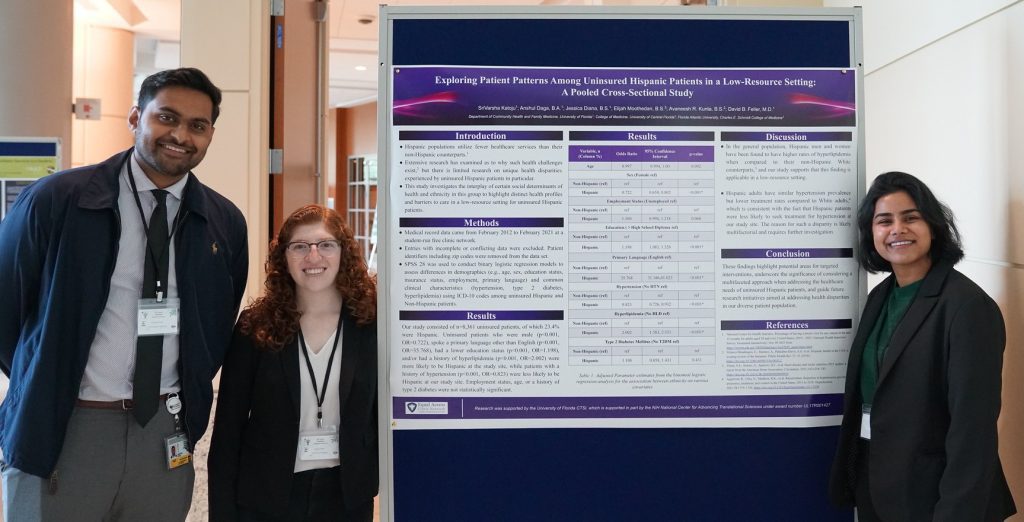
Imagine Carlos, a homeless man suffering from schizoaffective disorder, who has trouble consistently managing his health conditions. How can physicians build trust with him, find realistic solutions and improve his underlying health?
This was the scenario posed to medical students across Florida by keynote speaker Dr. Ana Turner at the recent Chapman Regional Conference held at UCF’s College of Medicine. The answer, she says, lies in the event’s theme, seeing care through the eyes of the patient.
The annual Chapman conference provides an opportunity for Florida medical students to share their research and passion for providing more humanistic care.
“In medical school, we ask our students to learn a lot of stuff, but we don’t necessarily put emphasis on the kindness, compassion and love that comes with being a physician,” said Dr. Robert Watson, Trustee of the Jules B. Chapman and Annie Lou Chapman Private Foundation that funds the conference. “If students can walk away from this conference with those values reinforced, that would be a beautiful thing.”
Following Dr. Turner’s presentation, student leaders from medical school free clinics across the state came together to share ideas on how they care for their underserved patients, improve clinic operations and reach populations in need.
“It always amazes me how students can hear these problems that sound insurmountable, but through their own ingenuity, they find ways to solve them,” said Dr. Watson.
As part of the panel, students were asked what keeps them motivated to volunteer at their free clinics, on top of the heavy academic strain of a medical school curriculum. One student, who volunteers at the UCF’s Chapman Compassionate Care Clinic for patients experiencing homelessness in downtown Orlando, spoke up with tears in her eyes.
“No one comes to medical school to study, they come because they love people,” she said. “And for me, there’s nothing more fulfilling than translating for a Spanish-speaking patient.”
Alia Jiang, a second-year medical student at Florida State University, attended the Chapman Regional Conference due to interest in Humanities in medicine. As a member of her college’s arts in medicine program, she is grateful for conferences like this one.
“In medical school, it is easy to get bogged down in cold details and lose the soft skills and bedside manner,” she said. “It can be hard to escape the bubble of our own schools, so I am truly grateful that this conference gets to expose us to how other schools see the patient experience.”
Following the panel discussion, students were given the opportunity to mingle and discuss research they have conducted before attending the breakout rooms, where speakers gave presentations to the students.
UCF’s own Dr. Janice Cato Varlack and Dr. Tolu Adebanjo McKenzie conducted their breakout room on Trauma Informed Care, in which they presented four patient visits with “Maria,” a diabetic patient with a history of abuse and housing insecurity who struggles to find time to manage her diet while dealing with her life circumstances. At each visit, Dr. Cato Varlack spoke with Maria with varying levels of trauma awareness and empathy toward. Students were encouraged to critique each patient visit to build a better, more empathetic patient interaction.
“As part of caring for unsheltered patients, some learners have questions about how to get to the heart of a patient’s story and build that trust,” said Dr. Cato Varlack. “Maria’s story is common, and it is important as physicians to empower patients like Maria to feel they are in control of their care.”
Fitting with the theme of the event, Kamalakar Shenai, a kidney failure patient-turned-advocate spoke on his experience as a patient. He has experienced the difficulty of living on dialysis and serves as a source of inspiration for others in the same situation.
“Many incredibly knowledgeable doctors can treat kidney disease, but they do not have the experience of siting in the dialysis chair for hours, staring at the ceiling every week,” he said. “I hope that the next generation of doctors will be more compassionate, humble and empathetic toward patients. Often what they need is not just knowledge, what they need is a friendly touch and an empathetic ear.”